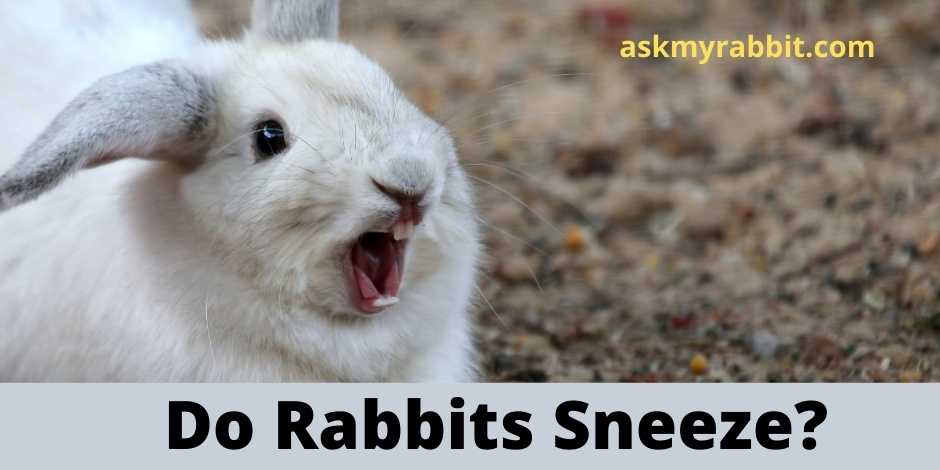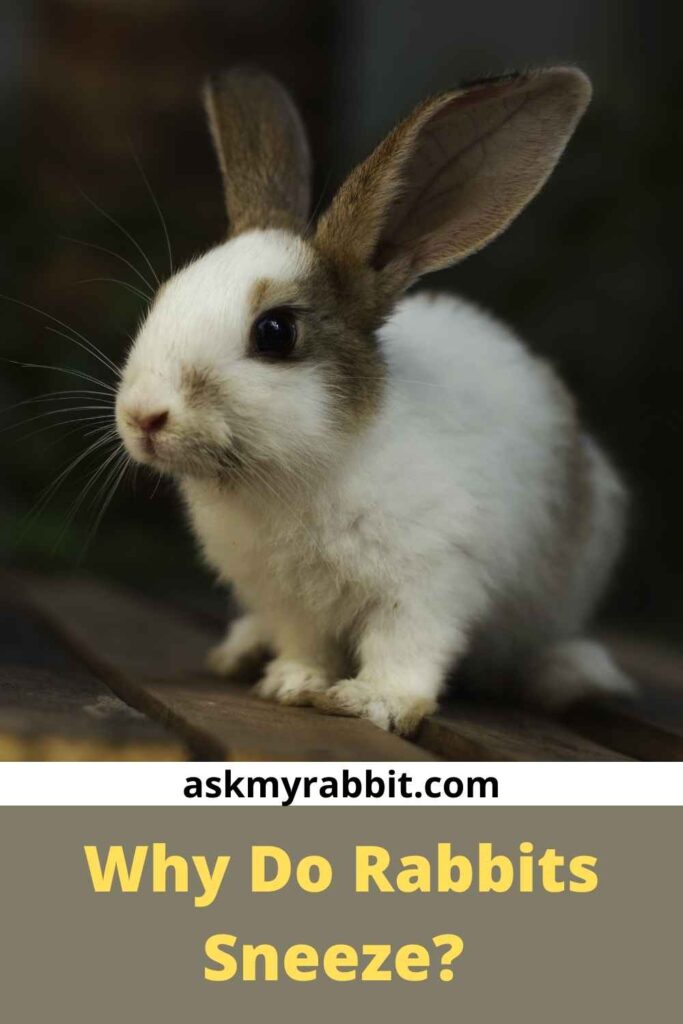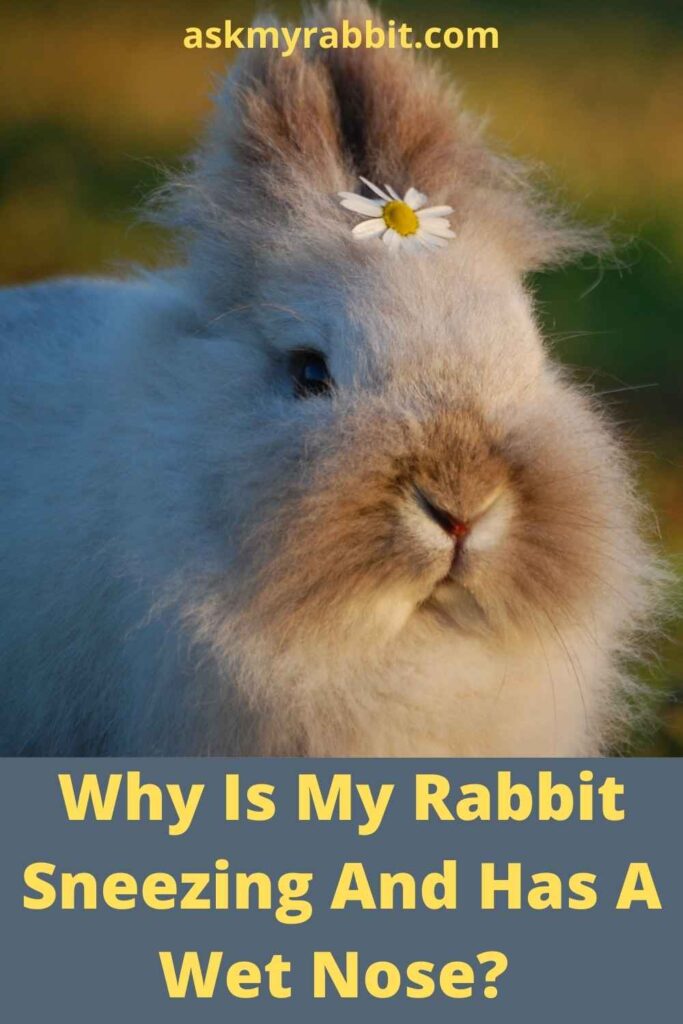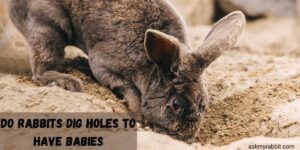Sneezing is one of rabbit’s loveliest noises. It is always followed by a charming face cleaning with their front paws. Rabbit sneezes, on the other hand, aren’t all adorable.
Yes, rabbits do sneeze. Sneezing occurs in rabbits for a variety of causes, some of which are far more worrying than others.
Sometimes your rabbit’s sneeze is caused by dust, smoke, or allergies that irritate his or her nose. Sneezing in rabbits should not be taken lightly since it can be an indication of a serious respiratory illness that. If it is not treated promptly, it can be deadly.
While the odd sneeze from your pet rabbit is unavoidable, you should be aware if they are sneezing regularly. You should also keep an eye on your rabbit’s surroundings. Excessive dust or strong odours might trigger recurrent sneezing.
In this article, we will inform you all about your bunny sneezing. So, keep reading!

Why Do Rabbits Sneeze?

Sneezing occurs when a rabbit’s nasal canal becomes inflamed. This can happen when an external item, such as a speck of dust, gets stuck in the rabbit’s nose. An internal illness or a build-up of mucus in the nasal tube might also irritate their nose.
The nostrils of rabbits are extremely delicate and sensitive. Even little irritants can cause a rabbit to erupt into a sneezing fit.
Your rabbit may sneeze frequently due to the following reasons:
1. Dust
Your rabbit may sneeze frequently if there is a lot of dust in the surroundings. This can also be due to hay dust. It is frequently seen at the bottom of hay sacks.
2. Allergic Reactions
Rabbits, like people, can suffer from a range of allergies. It’s not easy to figure out what a rabbit is allergic to. However, once you do, you’ll be able to make your rabbit feel better and stop sneezing.
3. Cigarette Smoke
Smoke may irritate a rabbit’s nose as well. Sneezing in your pet rabbit might be caused by someone in your family who smokes a lot.
4. Strong Smell
Rabbits’ delicate nostrils might respond to strong odours like perfume or cologne. Many cleaning chemicals have a strong aroma that might irritate rabbit nostrils.
5. Insufficient Bedding
The phenols released by pine and cedar bedding and litter might irritate a rabbit’s respiratory system. These forms of litter should be avoided since they have been linked to liver issues in rabbits who have been exposed to them for an extended length of time.
6. Infection Of The Lungs
Upper respiratory illnesses and lower respiratory infections can both cause sneezing. If a rabbit has a respiratory illness, it’s critical to get medical help as soon as possible. This is because untreated rabbits have a poor recovery rate.
Do Rabbits Sneeze Sometimes?
Yes, a rabbit may sneeze sometimes. A rabbit who sneezes once in a while is nothing to be concerned about.
It is conceivable that any dust in their environment irritated the rabbit’s tiny nose. You don’t want to entirely disregard your rabbit’s sneezes, though. There are times when this conduct is an indication of a far more serious health issue.
What Does A Rabbit Sneeze Sound Like?
A rabbit sneezing sounds like a dry cough. Your bunny may sneeze for a variety of causes. When a bit of grass or pollen gets lodged in their nasal canal, they may sneeze.
Sneezing might also be caused by a piece of dust blocking your bunny’s airway. When a rabbit has a respiratory ailment, they may sneeze often until they recover.
Should I Be Worried If My Rabbit Is Sneezing?

If your rabbit’s sneeze is accompanied by any of the symptoms listed below, you should be worried. Take your bunny to the veterinarian for a check-up. Your veterinarian can assist you identify whether or not your rabbit has a respiratory illness that requires medical attention.
1. Frequent Sneezing
If your rabbit is constantly sneezing, it might be an indication of a more serious problem. This is particularly true if the sneeze is followed by nasal discharge or mucus of any type.
Dry sneezes might be an indication of a respiratory illness in your rabbit. However, they can also be a sign of allergies. It’s one of those symptoms that you should seek medical attention for just in case.
2. Snoring
Even if your bunny does not have any health issues, some rabbits snore on a daily basis. A rabbit that didn’t snore before but started snoring after they started sneezing a might be suffering from a respiratory obstruction. This might be caused by mucus or an external item blocking the rabbit’s nasal canal.
3. Sneezes With Snotting
A rabbit with a runny nose is actually rather deadly. It is extremely difficult for rabbits to breathe via their mouth since they are obligate nose breathers.
Rabbits may have difficulties breathing if snot plugs the nasal tube. When your rabbit sneezes, snuffles, a common respiratory ailment, will usually start.
This will be accompanied with a watery discharge. As the sickness worsens, the mucus thickens. This poses a larger threat to the rabbit’s ability to breathe.
4. Irritated Eyes
While watery eyes in rabbits aren’t necessarily indicative of a significant health issue, they are a typical indicator of respiratory infections. If your rabbit’s watery eyes are accompanied by sneezing or nasal discharge, there’s a good possibility he is suffering from a significant health condition.
5. Energy Deficiency
Your rabbit may begin to sneeze frequently and have less energy than normal. This might indicate that they are unwell.
Because various rabbits have varied degrees of activity, you’ll need to pay attention to your rabbit’s distinct habits. It’s worth bringing them in for a checkup if they’re generally enthusiastic but no longer want to play at the usual times of day.
6. Balance Issues Or Head Tilt
Head tilt is a disorder that causes rabbits to constantly tilt their heads ninety degrees to the side. In rabbits, it’s linked to a lack of equilibrium.
Many causes can induce a head tilt and a general lack of balance, including stroke, cancer, and ear infections. These imbalances can also be caused by respiratory illnesses. If your rabbit develops head tilt, you should seek veterinarian help.
7. Aversion To Food
Rabbits’ digestive systems are delicate, thus they must feed regularly throughout the day. Most rabbits will be content to eat their meal as well as some tasty leafy leaves.
A decrease of appetite can be a sign of a variety of ailments in rabbits and should not be ignored. If your rabbit is entirely refusing to eat, you should regard it as a medical emergency and take him to the veterinarian as soon as possible.
8. Breathing Problems
Wheezing, coughing, attempted mouth breathing, and a whistling sound while breathing are all signs that your rabbit is having trouble breathing. These symptoms indicate that something is blocking your rabbit’s nasal passage. If your rabbit is also sneezing, the blockage might be caused by an excessive quantity of mucus.
9. Drooling
If you observe your rabbit drooling, it’s a sign that he or she is straining to breathe via their mouth. It might indicate that your rabbit’s nasal tube is obstructed and they are suffering from a respiratory illness. Make an appointment with your veterinarian if you detect this behaviour in your bunny.
10. Matted Fur Inside The Paws
When a rabbit sneezes, it might be difficult to tell if there was any snot. This is due to the fact that the rabbit instantly cleanses their face. Any nasal discharge will be seen on the inside side of your bunny’s paws. To tell if your rabbit’s sneezes are indeed clear of snot, look for sticky and matted fur in this region.
Why Is My Rabbit Sneezing When Eating?
Your rabbit may be sneezing while eating due to allergy. Rabbits, like their human companions, can be allergic to a variety of irritants. This includes home dust, room fresheners and cigarette smoke.
Strong chemicals like bleach and ammonia, as well as bedding made from pine or cedar shavings, are typical sources of respiratory irritation in bunnies. Fines and chaffs located in the bottom of hay bags may cause sneezing in some bunnies.
Sneezing while eating might be a sign of a developing respiratory illness too. Respiratory infections are far more concerning. This is because they are typically linked with nasal discharge and watery eyes.
Bunnies with respiratory illnesses may become unable to eat or drink It’s always better to seek the advise of bunny’s veterinarian, regardless of the reason of your rabbit’s sneezes.
If the sneezes are caused by allergies, you may be able to determine the source and eradicate it from the surroundings by trial and error. If your bunny’s sneezing is due to a respiratory infection, your veterinarian should be able to give the appropriate medication to help him go back to normal.
It’s important to remember that respiratory diseases are extremely contagious. Therefore, make sure your bunny’s enclosure is well cleaned. This is so that once their treatment is over so they don’t re-infect themselves.
Is It Normal For Rabbits To Sneeze A Lot?
No, it is not normal for a bunny to sneeze a lot. If you see your pet bunny sneezing continuously and having runny nose and eyes, we recommend that you visit a veterinarian as soon as possible.
If your rabbit has a clear discharge, it has snuffles. This is an upper respiratory infection in bunnies. Antibiotics can be used to treat the infection once the bacterial species has been identified.
If your rabbit sneezes dryly frequently, it may have an allergy, overgrown teeth, or nasal discomfort. This irritation must be eliminated or remedied.
A veterinarian should always be consulted if your rabbit is sneezing and creating a white discharge. An allergy or nasal irritation is the most likely medical cause for your rabbit’s dry sneezing.
Before the symptoms of sneezing and irritation disappear, you must eliminate the source of the irritation from your rabbit’s mouth, nose, or living environment.
Why Is My Rabbit Sneezing But Has No Discharge?
Your rabbit may be sneezing but have no discharge due to an allergy. It’s less alarming if your rabbit sneezes without producing any discharge. This sneeze, on the other hand, will irritate your rabbit.
If the sneeze is neglected for an extended period of time, the source of the sneezing may worsen.
Dry sneezing is a frequent allergy symptom. An allergy will cause a sneezing episode, after which your rabbit will resume normal behaviour. You must determine what is producing the allergic response and eliminate the source of the reaction.
There are no restrictions on what a rabbit can be allergic to. Dietary responses, as well as reactivity to plastic food and water bowls, are prevalent. Dusty hay is also a problem and a cause of allergy for many rabbits.
Consider what new foods you’ve introduced to your rabbit’s diet. Remove them one by one and see your rabbit’s reaction.
Rabbits can be sensitive to their surroundings as well. If your rabbit only sneezes when you touch him, it might be allergic to your perfume or cologne.
It’s important to keep in mind that some rabbits are allergic to grass and pollen. This might be the case if your rabbit exercises outside.
It’s annoying but not hazardous if your rabbit just gets dry sneezes. Sneezing will stop if the allergen is removed.
How Can I Stop My Rabbit from Dry Sneezing?
If your rabbit is constantly dry sneezing, you’ll need to go through a progressive elimination procedure. Even if it isn’t visible, it is allergic to something.
Clean your rabbit’s hutch more often and litter train your rabbit. Rabbit urine contains ammonia, which can accumulate in the bedding.
This can cause a rabbit to sneeze as a result. You might be able to stop the sneeze if you remove the ammonia from your rabbit’s hutch.
Consider where your rabbit’s hutch will be. Make sure your rabbit has enough air to breathe. Your rabbit will breathe in dust, smoke and other environmental allergens if there isn’t enough ventilation.
If this doesn’t work, take a closer look at your rabbit’s nutrition. It’s time to get rid of those stale pellets. You may even switch to a better brand. A good supply of high-quality hay will be enough to keep an adult rabbit fed and healthy.
Why Is My Rabbit Sneezing And Has A Wet Nose?

Your bunny may be sneezing and have a wet nose due to snuffles. In rabbits, the symptoms of runny eyes, runny nose, and sneezing are known as snuffles. A persistent bacterial infection in the tear ducts and nasal sinuses is frequently the source of these symptoms.
Pasteurella spp. And Staphylococcus spp. Are the most common bacteria involved. Runny eyes and damp, tear-stained fur on the cheeks are frequently the first signs of a problem.
Initially, the discharge from the eyes is clear, just like normal tears. The discharge might become white-yellow in colour and the fur around the eyes can fall out if left untreated.
Your rabbit will develop a discharge from its nose as the illness worsens. He will wipe away the discharge with its front paws. The dried discharge may be seen on your rabbit’s front paws.
Snuffles can cause pneumonia, which needs very intense treatment and. It is often, very deadly in rabbits.
You should take your rabbit to the vet if you feel it has snuffles. Your veterinarian will inspect your rabbit thoroughly, including its teeth, and may ask you questions about its nutrition and living conditions.
It’s possible that your rabbit’s eyes will be swabbed to gather microorganisms. These bacteria will be cultured before being subjected to various antibiotics. A ‘culture and sensitivity’ test will aid your veterinarian in prescribing the most effective antibiotic for your rabbit.
Antibiotics are commonly given in the form of drops or creams that are administered to your bunny’s eyes directly. In order to treat the infection in the nasal sinuses, oral antibiotics may be required.
If your rabbit’s teeth are determined to be causing difficulties, they may need to be cut or filed. To assist avoid more tooth issues, your veterinarian may suggest that you make certain dietary modifications to your rabbit’s diet.
Snuffles is a tough disease to cure. It may take several months of treatment before the problem improves.
Why Is My Rabbit Sneezing White Snot?
Your rabbit may be sneezing white snot due to an Infection. Pasteurella multocida is a gram-negative bacterium that comes in a variety of types. The signs and symptoms of infection vary depending on which strain is infecting a rabbit.
Some strains can be found in rabbits’ nasal passages. However, they don’t create any difficulties unless the bunny is agitated or their immune system is impaired in some manner.
Pasteurella infection commonly causes symptoms in the upper respiratory tract. Watery nasal discharge and sneezing are common in infected rabbits. This is followed by a thick, white or yellowish nasal discharge.
Because of the mucus in their nose, affected rabbits may produce a loud snuffling or snoring sound. Infected rabbits typically develop nasal discharge and matting on their front paws because they brush their faces with their front paws.
Pasteurella illness is very infectious and difficult to treat. Therefore, do everything you can to avoid an active infection and seek emergency veterinarian attention if your rabbit exhibits symptoms.
Reduced stress is crucial in preventing active infections in your bunny and reducing the severity of the symptoms if he m does become ill. Bad nutrition, a poor living environment and living alongside aggressive rabbits or other household pets and children, are all common stresses for rabbits.
You should always supply your rabbit with suitable housing and other necessities. This includes limitless Timothy hay and fresh water, high-quality food pellets, and fresh greens on a regular basis.
Because the sickness is very infectious, it’s best not to allow your rabbit interact with other rabbits. Human handling can spread the sickness from one rabbit to another. Therefore, wash your hands between touching rabbits.
What Should I Do If My Rabbit Is Sneezing?
If your bunny is sneezing continuously, you should take him to a veterinarian. However, if your rabbit isn’t sneezing due of a respiratory infection or a medical concern, you may try changing their surroundings to see if that lessens the quantity of sneezing they do.
You might try to eliminate dust or allergy sources that cause a rabbit to sneeze more frequently. This can assist in relieving your rabbit’s discomfort and preventing irritating nasal irritation.
You may follow these steps in order to reduce your bunny’s frequent sneezing:
1. Do Not Smoke
While it is unknown what long-term consequences second-hand smoke has on rabbits, it does appear to irritate the rabbit’s nasal tract in the short term. When you’re around your rabbit, it’s better to avoid all forms of smoking, including e-cigarettes.
2. Keep Your Bunny’s Enclosure Clean
Dust particles might accumulate in your rabbit’s enclosure if it isn’t cleaned regularly. Ammonia levels in rabbit urine are likewise high.
This might irritate rabbits when it accumulates. Therefore, it is a good idea to wipe out their litter box on a regular basis.
3. Determine Potential Allergens
Your veterinarian may be able to tell you whether your rabbit is allergic to anything. However, you may need to conduct your own research. Remove certain things from your rabbit’s habitat one at a time to see if you can figure out what’s causing the allergies.
4. Avoid Hay Dust
Hay bags of lower grade frequently include a considerable number of hay dust particles. If your rabbit appears to be sneezing a lot due to hay dust, you should choose a higher-quality brand with longer strands of hay and fewer dust.
Frequently Asked Questions
Are Rabbit Allergies Common?
Rabbits are typical home pets, therefore, allergies in them are common. However, serious respiratory allergies in rabbits are uncommon.
How Do I Know If My Rabbit Is Cold?
Feeling your rabbit’s ears is an easy method to see whether they are cold. Ears that are very hot or chilly are a tell-tale indicator of a bunny’s fever.
What Are Rabbit Snuffles?
In rabbits, the symptoms of runny eyes, runny nose, and sneezing are known as snuffles. A persistent bacterial infection in the tear ducts and nasal sinuses is frequently the source of these symptoms.
Final Words
To conclude, the following medical explanations apply to a rabbit sneezing frequently
- Snuffles may cause sneezing.
- Something in your rabbit’s surroundings is causing an allergic response.
- Something is stuck in your rabbit’s nose, causing it to be irritated.
- Your rabbit’s teeth have grown out of control, and the root is irritating his nose.
Snuffles and other respiratory diseases are most commonly caused by stress. Make sure your rabbit has a consistent daily schedule and receives enough of exercise. Keep your rabbit’s hutch clean and well-ventilated to ensure that it is happy and comfortable.
We recommend that you drop down your doubts and queries regarding your furry bunny’s quirky lifestyle in the comment section below. We will answer them soon!






